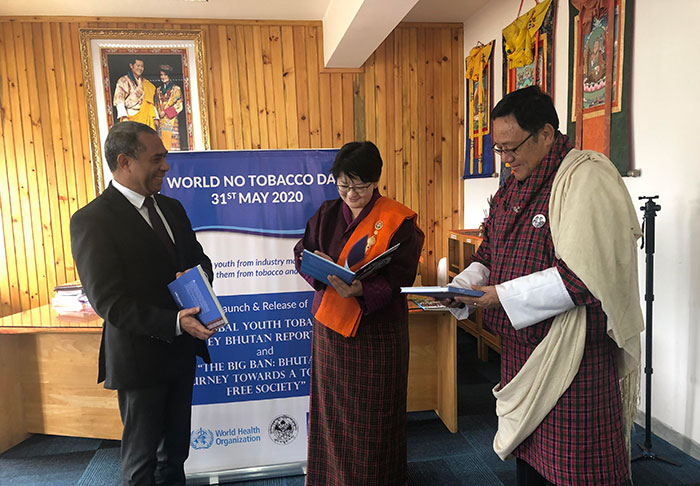Health minister calls for collective effort to address the issue
Younten Tshedup
Almost 16 years after Bhutan banned the sale of tobacco, use of tobacco is still rampant among youth with more than one in five students currently abusing tobacco products.
A recent study has now found out that 22.2 percent of students aged between 13 and 15 currently use tobacco products. Out of that 17.3 percent smoked cigarettes and 12.5 percent used smokeless tobacco products (chewing tobacco).
The study, Global Youth Tobacco Survey (GYTS) Bhutan Report, 2019 was launched by Health Minister Dechen Wangmo coinciding with the World No Tobacco Day yesterday.
The survey was conducted in 17 dzongkhags where 4,712 students from grades VII to XI were interviewed. Of the total surveyed, 2,344 students were aged 13 to 15 from 50 different schools.
According to the survey, more than four out of 10 (44.3 percent) students started smoking between the age of 12 and 13. About 13 percent of those who smoked cigarettes had their first puff before the age of 10 and one in 20 students tried their first chewing tobacco at the age of seven or younger.
Among those chewing tobacco, more than 45 percent also had their first experience between the age of 12 and 13. About 13 percent tasted their first smokeless tobacco before the age of 10 while more than one in 15 students had their first taste at the age of seven or younger.
Among the current cigarette smokers, over 40 percent smoked more than one cigarette sticks in a day and about 1.3 percent smoked between 11 to 20 sticks daily.
Susceptibility to tobacco use among youth appeared ‘worrisome’, as 15.9 percent students who never consumed tobacco were found susceptible to tobacco use in the future, states the report. “Also 7.3 percent students who have not smoked and 9.3 percent who have not used smokeless tobacco thought they might enjoy using the products.”
Access and availability
Despite the standing law that prohibits cultivation, harvesting, manufacture, supply, distribution and sale of tobacco products in the country, the report states that youth in Bhutan have easy access to tobacco products.
The study found that 55 percent of students who currently smoke cigarettes bought them from a shop or a street vendor without any objections. Similarly, 52.4 percent of current smokeless tobacco users got their supply from a shop or a street vendor. 85 percent bought their cigarettes or other tobacco products from within the country.
According to the report, the Tobacco Control Rules and Regulations 2013 issued under the Tobacco Control Act 2010 specifically prohibits any minor (a person who is below the age of 18 years) from importing any tobacco products, even for personal consumption. However, 16.8 percent students were of the opinion that they can purchase tobacco products near their school.
Cessation
The survey found that more than eight in 10 students who currently smoke or chew tobacco tried to stop the habit in the past 12 months. More than 87 percent of current smokers and 84 percent of smokeless tobacco users thought they could stop using the products if they wanted to.
“Thus, there is a pressing need to provide quality tobacco cessation services specifically aimed at youth, addressing both smoking and smokeless tobacco addiction,” the report states.
Second hand smoke (SHS)
The survey revealed that more than two in six students were exposed to second-hand-smoke (SHS) in enclosed public places and 35.9 percent of students were exposed to SHS in outdoor public spaces. Additionally, more than half of the students (55 percent) were exposed to SHS inside the school building or outside within the school premises.
Also, 17 percent of students were exposed to SHS at home.
Health Minister Dechen Wangmo said that it is disheartening to know that 22.2 percent of school going children currently use tobacco. She said that this would compromise the country’s human capital, as tobacco usage is a precursor for many of the non-communicable diseases responsible for the growing global deaths.
Lyonpo said that the issue requires immediate attention of the agencies concerned. “Knowing all the ill effects of using tobacco products, if we don’t take a consulted, united and collective effort today, we will miss the boat.”
She said that the topic on tobacco is considered a taboo and families do not discuss about the harmful effects of using it. “Many of us shy away from starting such topics with our family. If we cannot have this kind of conversation in the comfort of our own homes and in our own relationship, then I think, in whatever we do, we will fall short.”
Lyonpo said that empowering people with correct information to help them make right decisions and providing them with an enabling environment to make such decisions is crucial.
“This responsibility falls on stakeholders like the health and education ministries including other agencies. I think waiting for the industries (tobacco industries) to change, is an unrealistic expectation.”
She said that the country’s tobacco act has been there for over a decade but tobacco users are still growing. “To reduce the supply, we banned the sale of tobacco but in the current Covid-19 situation, we are realising that all the illegal trades that are happening along the border areas is due to this dependency. It is compromising all our efforts to prevent the disease from entering the country. So is putting a ban a solution to our problems?”
Lyonpo said that the World No Tobacco Day, observed every year should be taken as an opportunity to bring in a way forward to address this issues holistically. “I believe that, if you want to see the change, be the change. We have to act now.”


